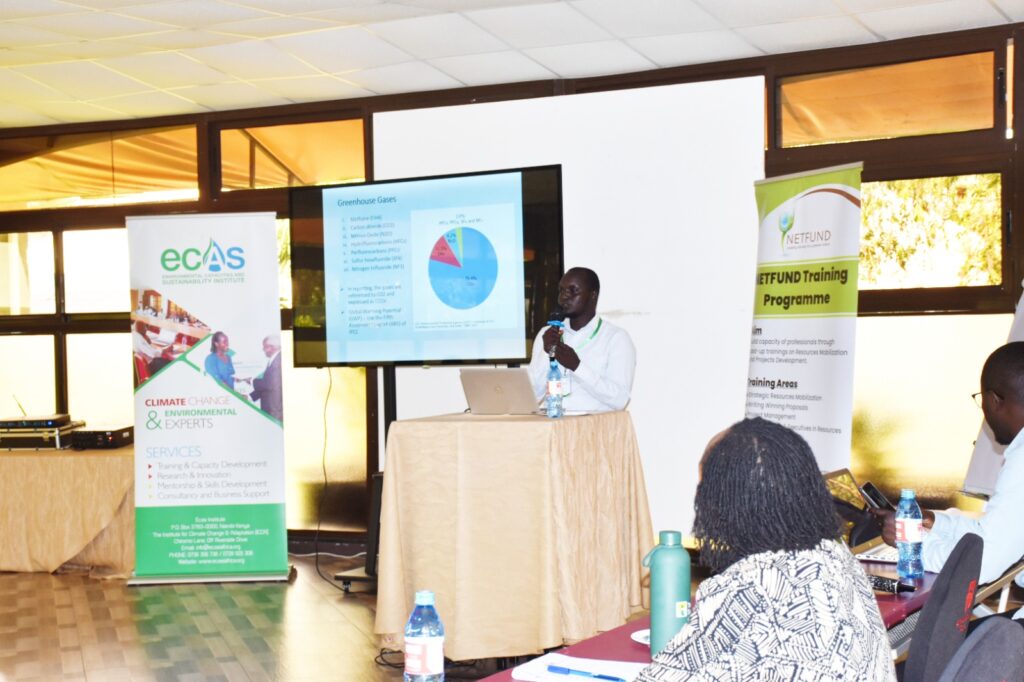
CONCEPT NOTE
INTERNATIONAL TRAINING ON INTRODUCTION TO CARBON MARKETS AND DEVELOPMENT OF CARBON-RELATED PROJECTS
BACKGROUND
As the world accelerates efforts to combat climate change, carbon markets have emerged as a critical tool for reducing greenhouse gas (GHG) emissions while promoting sustainable development. Carbon markets allow countries, organizations, and businesses to trade carbon credits, incentivizing emission reductions and supporting climate-friendly initiatives.
The Environmental Capacities and Sustainability (ECAS) Institute offers this course to provide participants with a solid foundation in carbon markets, carbon pricing mechanisms, and the development of carbon-related projects. It covers key aspects such as carbon credit certification, trading mechanisms, carbon finance, and project development under international frameworks like the Paris Agreement, Clean Development Mechanism (CDM), and Voluntary Carbon Markets (VCM).
This course is designed for professionals interested in leveraging carbon markets to finance emission reduction projects, comply with environmental regulations, and contribute to global climate goals. By combining scientific, economic, and policy perspectives, participants will gain the expertise needed to navigate the complexities of carbon markets and develop high-quality carbon offset projects.
OBJECTIVES OF THE TRAINING
By the end of this training, participants will:
- Gain a comprehensive understanding of carbon markets and trading mechanisms.
- Learn about compliance and voluntary carbon markets and their regulatory frameworks.
- Understand carbon pricing mechanisms such as carbon taxes and cap-and-trade systems.
- Acquire knowledge on carbon credit certification and project eligibility criteria.
- Develop skills in designing and implementing carbon offset projects in various sectors.
- Explore financing opportunities and investment strategies in carbon-related initiatives.
- Understand the role of nature-based solutions and renewable energy in carbon markets.
- Learn how to measure, report, and verify (MRV) emission reductions for carbon credits.
WHAT YOU WILL LEARN
By the end of this course, participants will have gained knowledge and practical skills in:
- Understanding the fundamentals of carbon markets, carbon credits, and emissions trading systems.
- Differentiating between compliance and voluntary carbon markets and their key players.
- Exploring carbon pricing mechanisms, including carbon taxes and cap-and-trade systems.
- Learning how to design, develop, and certify carbon offset projects under recognized standards.
- Understanding the eligibility criteria, methodologies, and additionality principles for carbon projects.
- Gaining insights into carbon credit certification standards, such as Verra (VCS), Gold Standard, and CDM.
- Exploring financing opportunities, investment strategies, and risks in carbon markets.
- Learning about Monitoring, Reporting, and Verification (MRV) requirements for carbon projects.
- Examining case studies of successful carbon-related projects across different sectors.
- Developing practical skills in carbon footprint assessments and project documentation.
DURATION AND PROGRAM
TARGET PARTICIPANTS
This course is designed for professionals and stakeholders involved in climate finance, sustainability, and environmental policy. It is ideal for:
Government officials, regulators, and policymakers working on climate policies, carbon pricing, and emissions trading. Private sector professionals, including corporate sustainability managers, investors, and carbon market analysts, seeking to participate in carbon trading or implement offset projects.
Environmental consultants, project developers, and carbon credit certifiers will benefit from practical insights into carbon credit generation and certification processes. Additionally, academics, researchers, and NGOs focused on climate mitigation, carbon finance, and sustainability strategies will find this course highly valuable.
TRAINING MODULES
| No | Module | Details | |
| 1. | Introduction to Carbon Markets and Climate Change Mitigation |
|
|
| 2. | Carbon Pricing Mechanisms and Trading Systems |
|
|
| 3. | Carbon Credit Certification and Standards |
|
|
| 4. | Developing Carbon Offset Projects |
|
|
|
5.
|
Financing and Investment in Carbon Markets |
|
|
| 6. | Case Studies and Best Practices in Carbon Markets |
|
|
| 7. | Policy, Governance, and Compliance in Carbon Trading |
|
|
| 8. | Practical Application and Project Development Workshop |
|
|
TRAINING STYLE
The course adopts a practical and interactive approach, combining expert lectures, case studies, hands-on exercises, and group discussions. Participants will engage in real-world project simulations, developing their own carbon offset projects while receiving expert feedback. Panel discussions with industry professionals will provide insights into market trends and best practices. Digital tools and models for carbon accounting and emission tracking will be introduced to enhance practical understanding.
This training ensures that participants not only understand carbon markets theoretically but also gain the skills and confidence to implement carbon projects, trade carbon credits, and contribute to climate change mitigation strategies.
GENERAL NOTES
- Training manuals and additional reference materials are provided to the participants.
- Upon successful completion of this course, participants will be issued with a certificate.
- We can also do this as a tailor-made course to meet organization-wide needs. Contact us to find out more: info@ecasiafrica.org.
- Payment should be sent to our bank account before the start of training and proof of payment sent to: info@ecasiafrica.org.
ABOUT ECAS INSTITUTE
The ECAS Institute designs and delivers independent and targeted training, research, and consulting services. Our work focusses on climate change and resilience building, carbon markets, renewable energy, nature-based solution, biodiversity conservation, agriculture and food systems, We are located in Nairobi Kenya and work across the African region. We have implemented training and research assignments in Kenya, Tanzania, Uganda, South Sudan, Somalia, Malawi, Rwanda, Congo, and South Africa. Globally, we have supported our partners from the UK, Denmark, Italy, Sweden, Germany, and USA.
